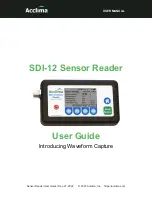
ACAM_64
3
1
Introduction
ACAM_64
is a USB-connected acoustic camera and beamforming acoustic array. Its 64-microphone
array allows it to produce 32x32-pixel (128x128-pixel interpolated) real-time images showing sound
sources in its field of view.
2
Warnings
•
Never blow air at or near the microphones.
•
Do not store or operate the instrument in environments where liquids could be projected onto
the microphone array. Ingestion of droplets of liquids (however small) into the pressure ports of
the microphones will damage them.
•
Do not store or operate the instrument in dusty environments. Ingestion of dust particles, even
a few microns in size, into the pressure ports of the microphones will damage them.
•
Do not store or operate the instrument at temperatures exceeding the following limits: -20 °C to
80 °C (-4 °F to 176 °F)
•
Do not expose the microphones to sound pressures in excess of 160 dB
SPL
.
3
Theory of Operation
An acoustic camera produces an image where the intensity of each pixel represents the amplitude of
acoustic waves coming from the corresponding direction. This is akin to an optical camera producing an
image where each pixel represents the intensity of light coming from the corresponding direction.
For an optical camera, the lens focuses light coming from a certain direction to the corresponding pixel
on the sensor or film. Each pixel in the image represents the intensity of light coming from a specific
azimuth (angle in the horizontal plane) and elevation (angle in the vertical plane). The lens does this by
slowing and delaying the light waves hitting the lens by precisely the right amount, so that all waves
coming from a certain direction arrive in phase in the focal plane, at the position of the corresponding
pixel.
An acoustic camera does much the same thing, except that the work of the lens is replaced by a digital
computational engine that processes signals captured by an array of microphones (see



























